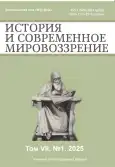Private universities in Russia: stages, problems and development prospects
- Authors: Orlov V.V.1, Tarakanov A.V.1, Tatochenko A.L.1
-
Affiliations:
- Institute of Public Administration
- Issue: Vol 7, No 1 (2025)
- Pages: 73-80
- Section: HISTORY OF RUSSIA
- URL: https://bakhtiniada.ru/2658-4654/article/view/292447
- ID: 292447
Cite item
Abstract
The purpose of the study is to analyze the current problems of the non-governmental sector of Russian higher education and to search for possible solutions. The first private higher education institutions (Moscow Practical Academy of Commercial Sciences and Lazarev Institute of Oriental Languages) appeared in the early 19th century. The abolition of serfdom and the great reforms of the 1860s and 1870s ensured a powerful growth of industrial production, which required personnel. By 1914, 46% of Russian universities were private, and 42% of the student body studied there. The development trajectory of private higher education was deformed by the First World War and interrupted by the revolutionary events of 1917. It resulted in the dominance of the state at all levels of the educational sphere. Private higher education received a new impetus for development in the context of the transition to a market economy. Russian private universities lag behind similar educational institutions in developed countries in their positions both in the global and domestic educational space. The private higher school has real development prospects due to the deepening of inter-university cooperation, the formation of regional educational clusters, the creation of «digital branches» in small towns, and the attraction of highly qualified teachers aged 60+ who were forced to end their careers in state universities during the implementation of the «Priority-2020» program.
Full Text
##article.viewOnOriginalSite##About the authors
Vitaliy V. Orlov
Institute of Public Administration
Author for correspondence.
Email: orlov.stoliva@mail.ru
SPIN-code: 6459-7210
Dr. Sci. (Hist.), Associate Professor, Professor of the Department of Social, Humanitarian and Natural Sciences
Russian Federation, MoscowAleksandr V. Tarakanov
Institute of Public Administration
Email: tarakanov66@mail.ru
SPIN-code: 4743-4020
Cand. Sci. (Law), Associate Professor, Professor of the Department of Civil Law Disciplines
Russian Federation, MoscowAlexander L. Tatochenko
Institute of Public Administration
Email: a.fem@yandex.ru
SPIN-code: 8153-7932
Cand. Sci. (Eng.), Associate Professor, Associate Professor of the Department of Social, Humanitarian and Natural Science Disciplines
Russian Federation, MoscowReferences
- Antropov R.V., Antropova N.A. Features of the private sector of the legal education system in Germany (on the example of the Bucerius Law School in Hamburg // State power and local self-government. 2016. No. 9. Pp. 51–56.
- Bessolitsyn A.A. Commercial education in Russia: historical experience and current state // Historical and economic research. 2018. Vol. 19. No. 4. Pp. 600–622.
- Zernov V.A. Non-state universities in Russia: current state, trends and prospects // Higher education in Russia. 2013. No. 4. Pp. 3–11.
- Kal'sina A.A. From the history of the development of private education in Russia // Bulletin of the Prikamsky Social Institute. 2016. No. 2 (74). Pp. 68–72.
- Klikunov N.D. How many private universities in Russia? // Science and Practice of Regions. 2022. No. 4 (29). Pp. 79–82.
- Orlov V.V. Problems of Development of Higher Education and Science in the Era of Digitalization of the Economy and Ways to Solve It // Actual Problems of Education and Science in the Era of Digitalization of the Economy and Ways to Solve It: Coll. sci. trac. Int. scientific-practical conf. Moscow, 2020. Pp. 68–76.
- Orlov V.V. Higher Education in Pre-Revolutionary Russia // Higher Education in Russia: Main Stages and Development Prospects. Collective monograph / AV Tarakanov, VV Orlov, AL Tatochenko et al. Moscow, 2024. Pp. 7–29.
- Orlov V.V., Skrynchenko B.L., Tatochenko A.L. Russian system of higher education: main quantitative characteristics of the current state // Education and Law. 2023. No. 3. Pp. 137–148.
- Pleshakov S.M. Place and role of non-governmental educational institutions in the educational services market // Non-governmental higher school of Russia: challenges of the new century, responses and development prospects: collection of scientific papers of the Interuniversity scientific and practical conf. Moscow, 2024. Pp. 95–102.
- Tarakanov A.V. University rating RAEX-100 in 2012–2022. statistical portrait of Russian universities // Education and Law. 2022. No. 11. Pp. 248–255.
- Tarakanov A.V., Tatochenko A.L. Small towns as an integral part of Russian statehood // Civilizational and constitutional foundations of Russian statehood: collection of scientific papers of the Interuniversity scientific-practical conf. Moscow, 2023. pp. научн. тр. Межвуз. научн.-практ. конф. М., 2023. С. 134–161.
Supplementary files








